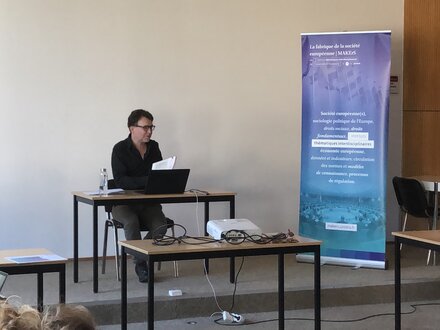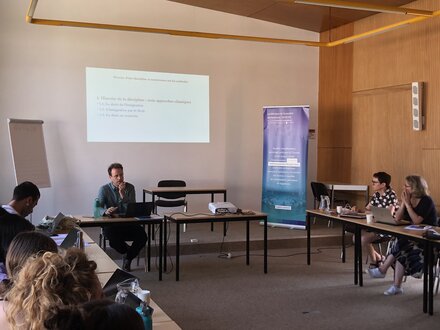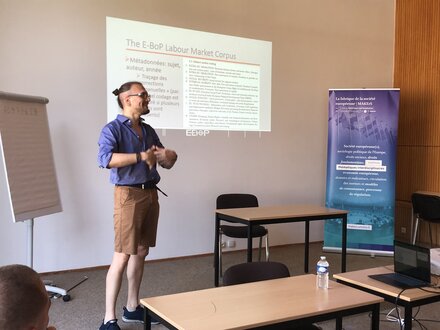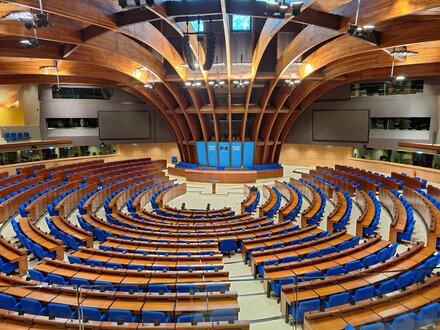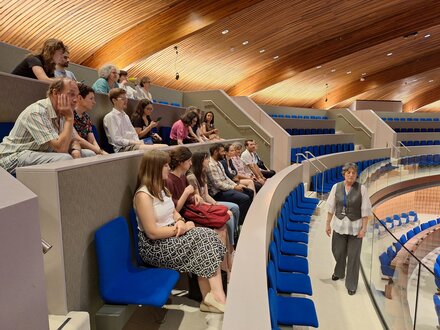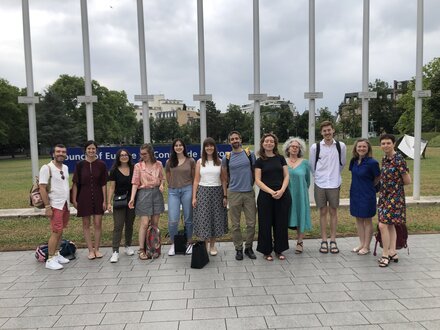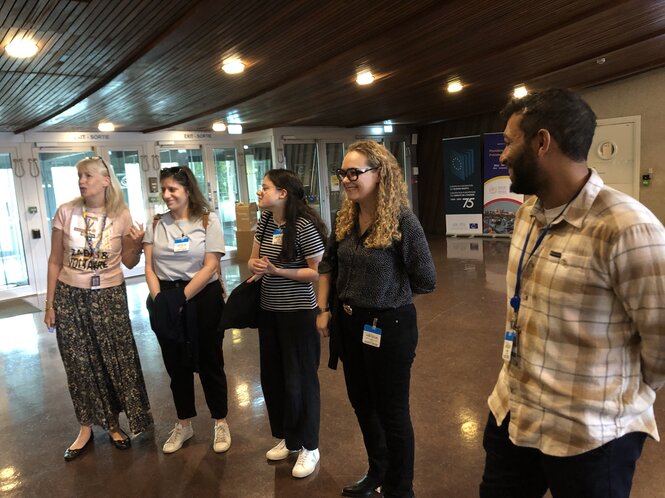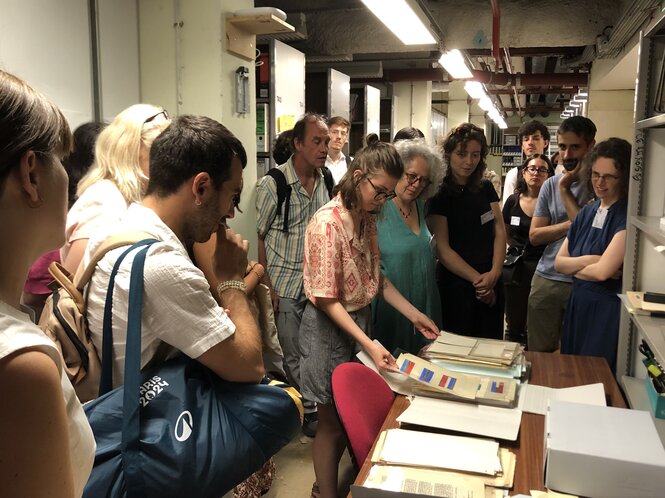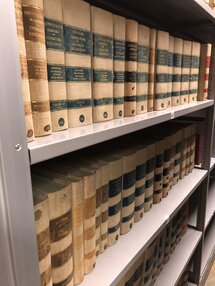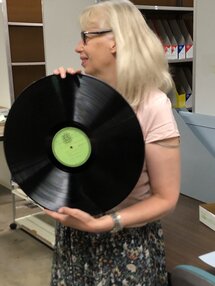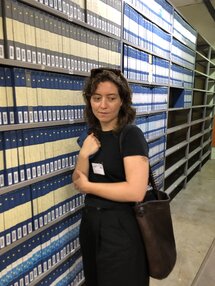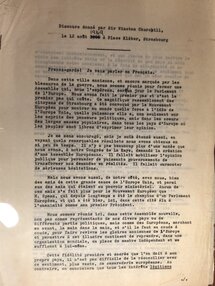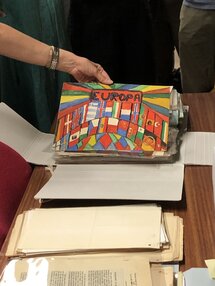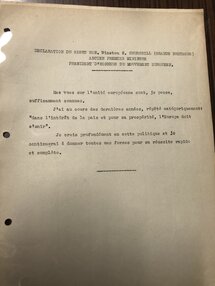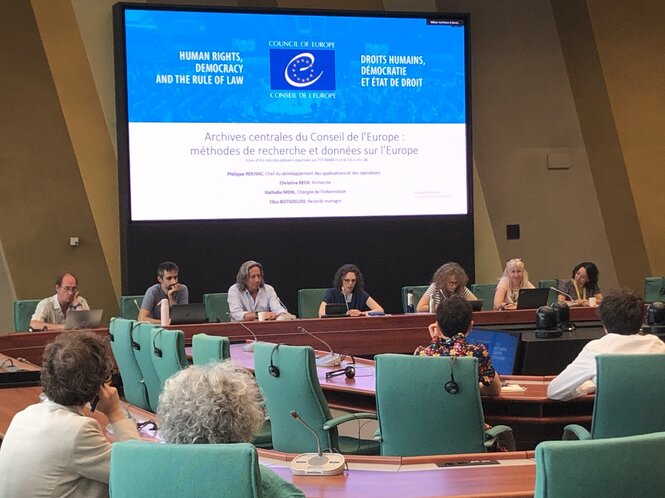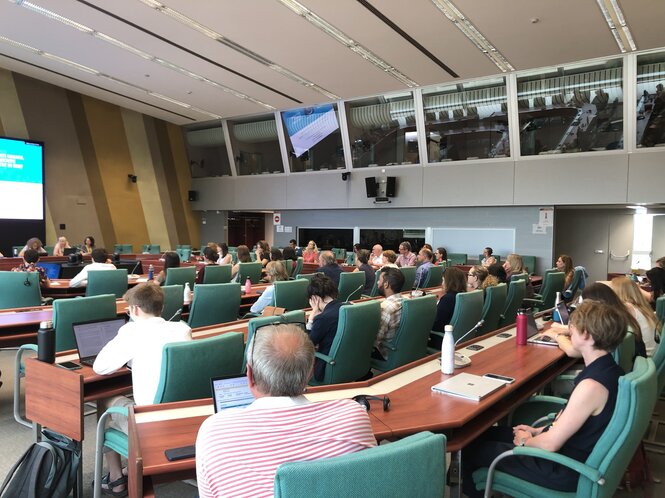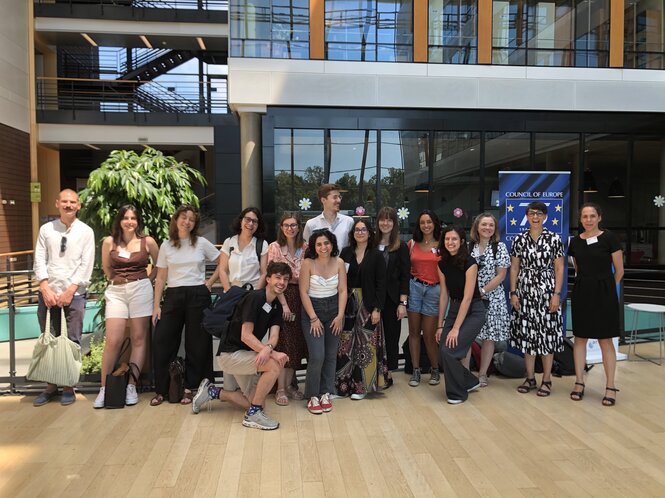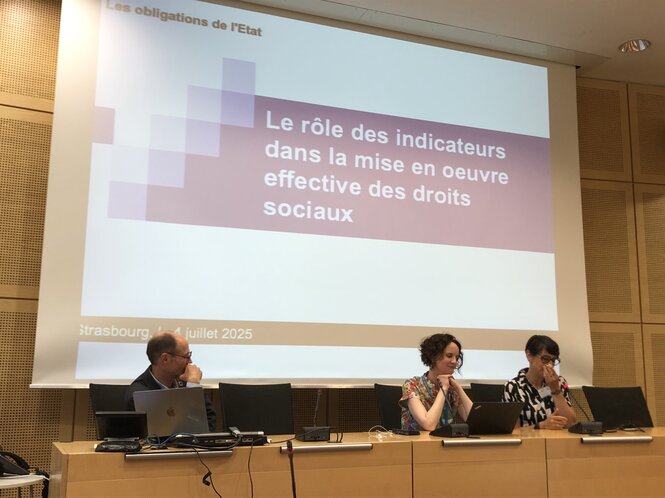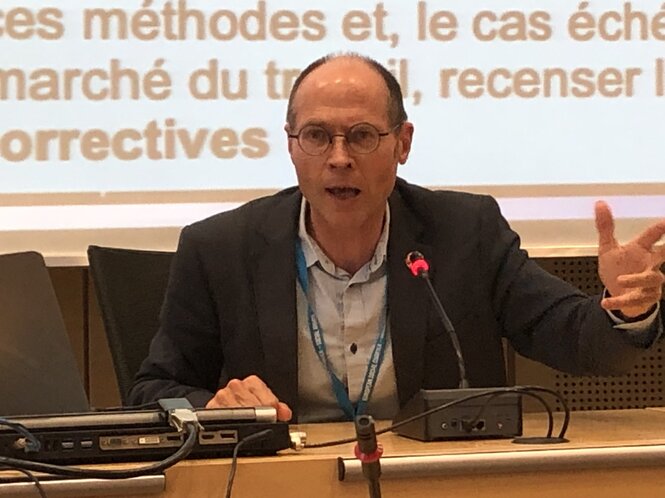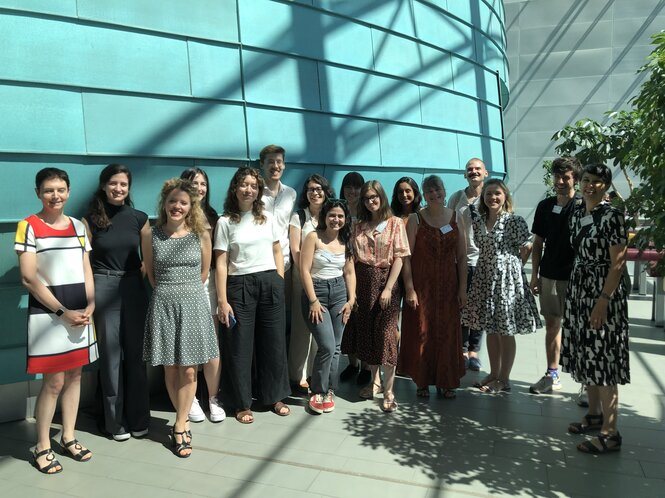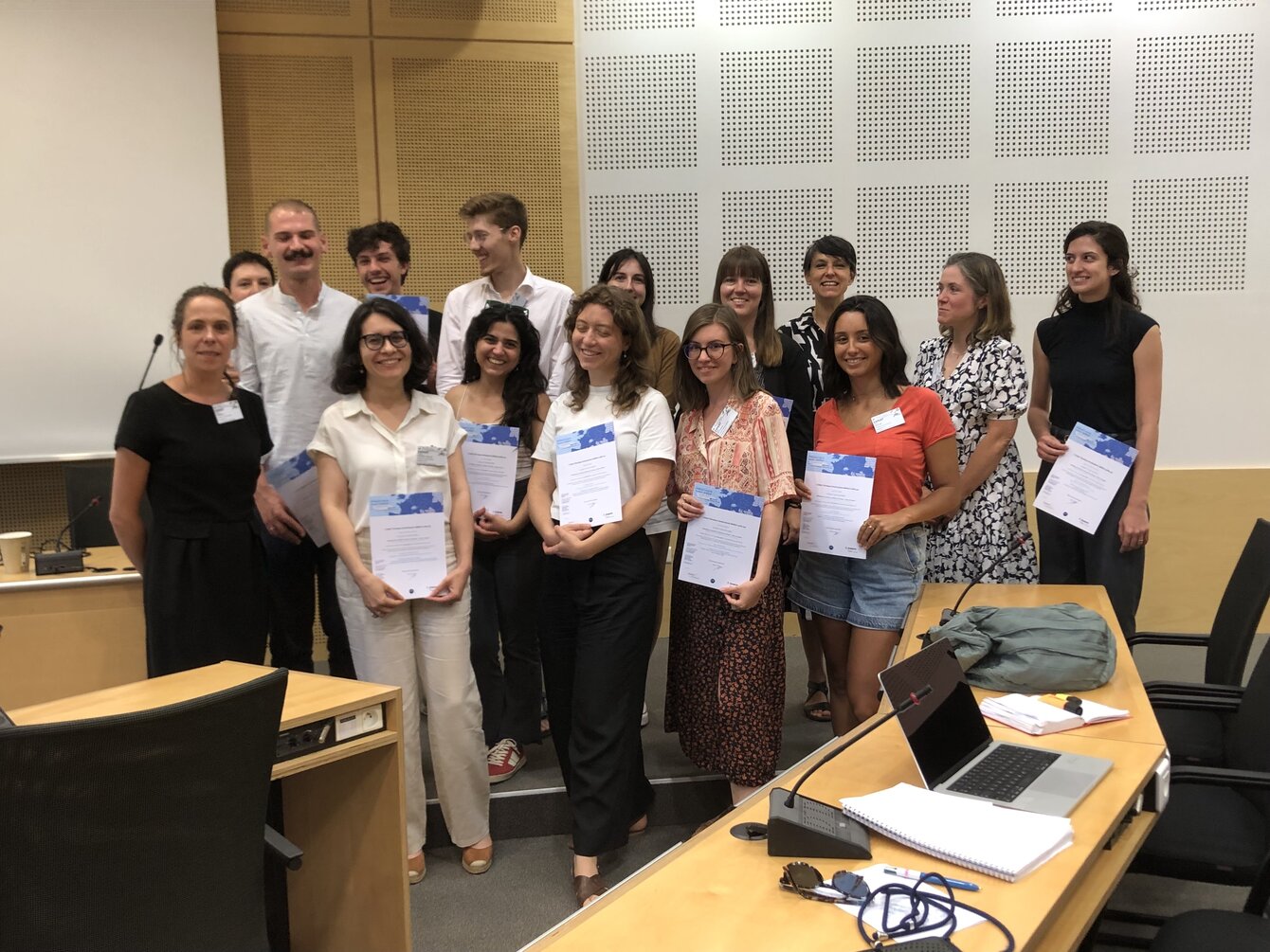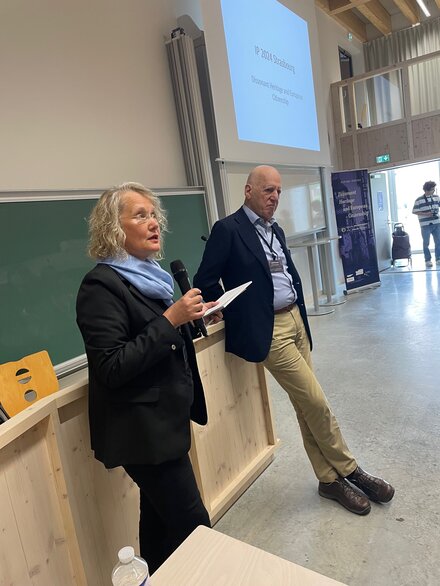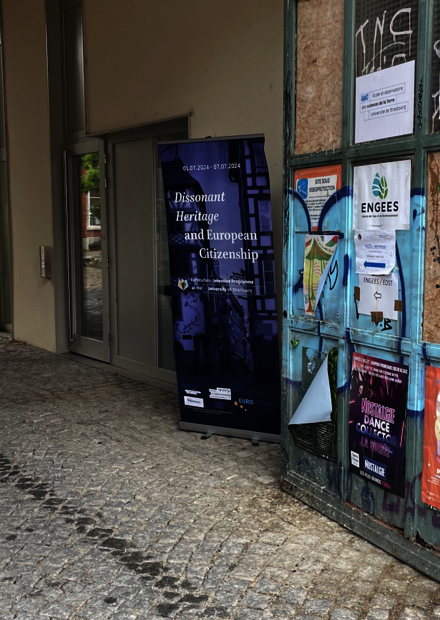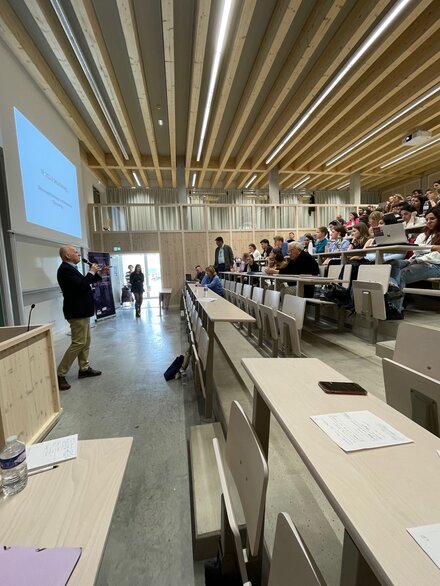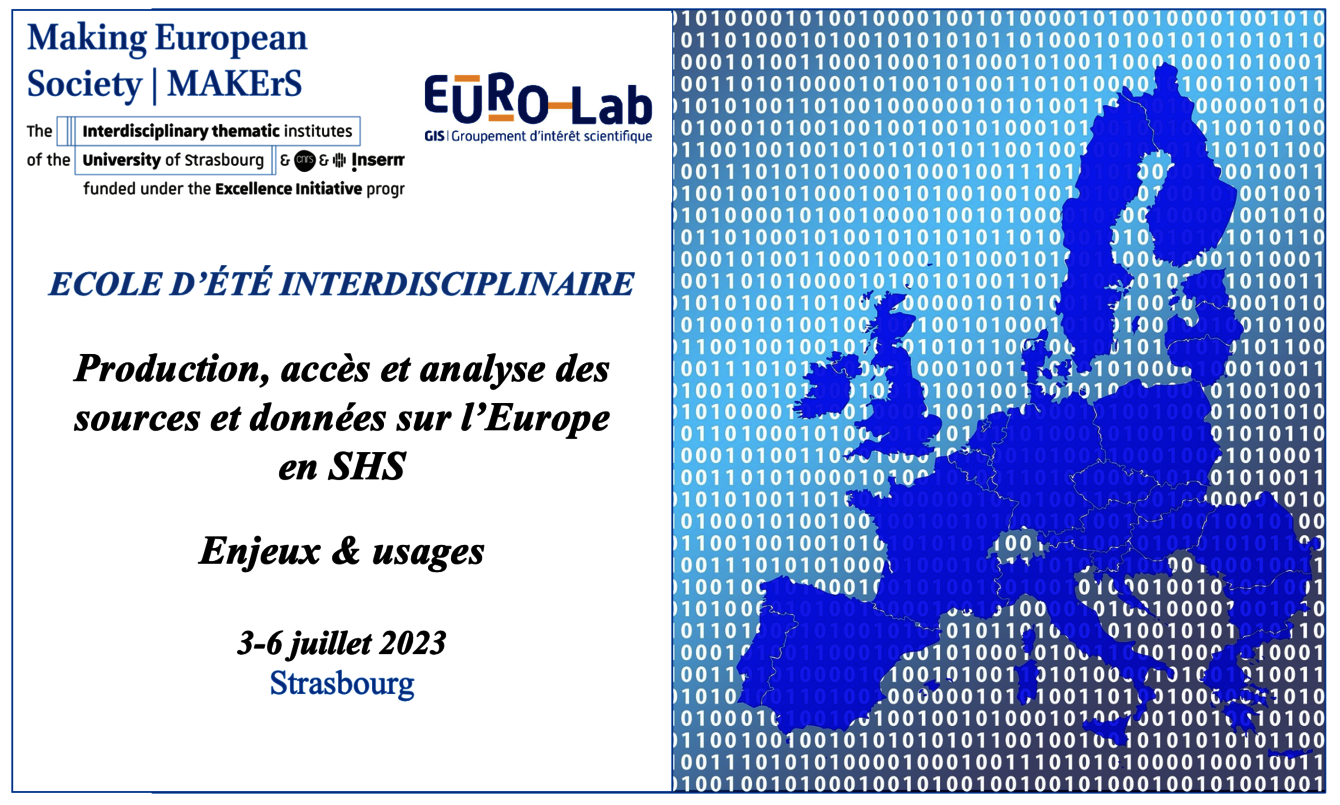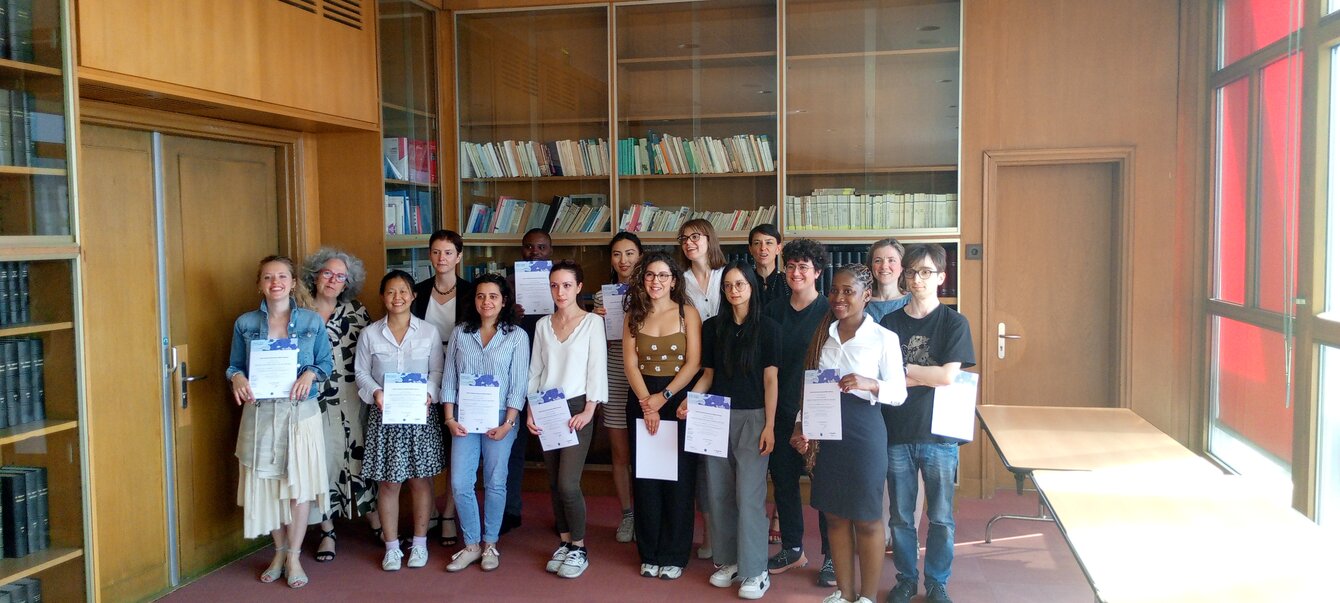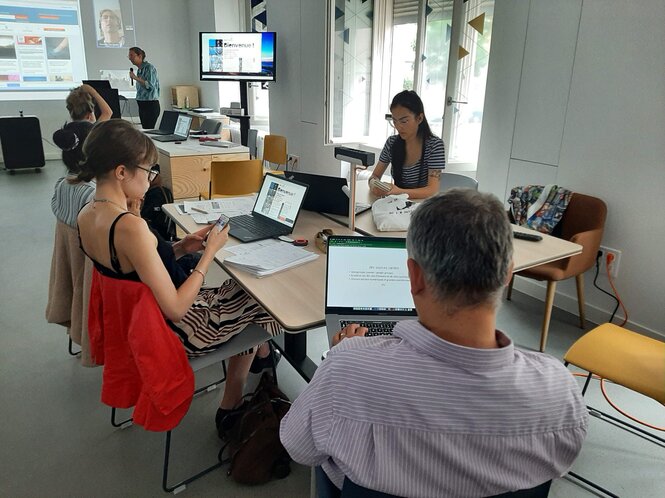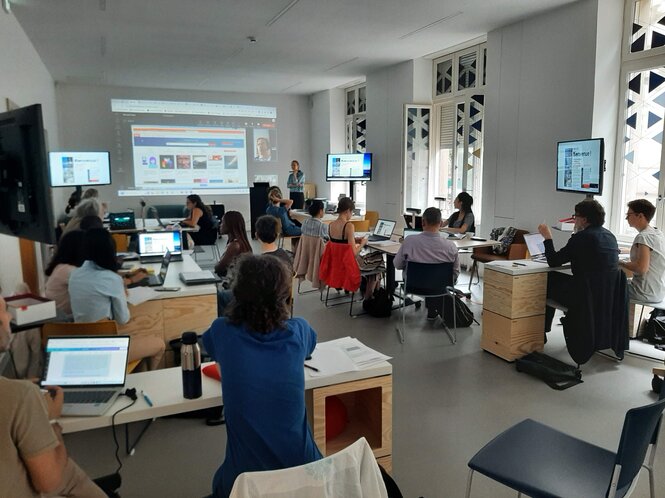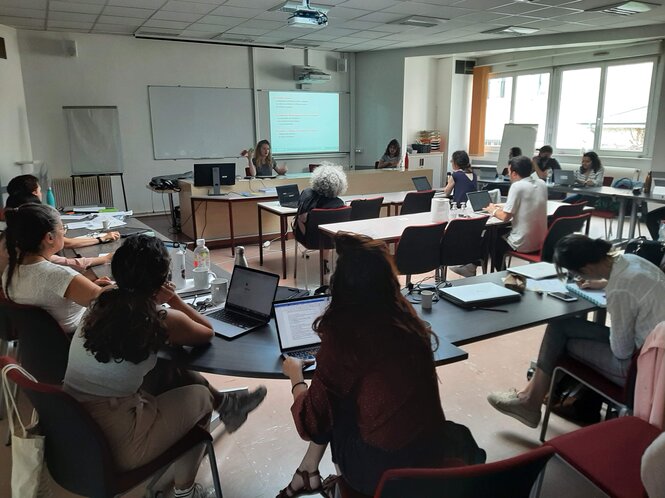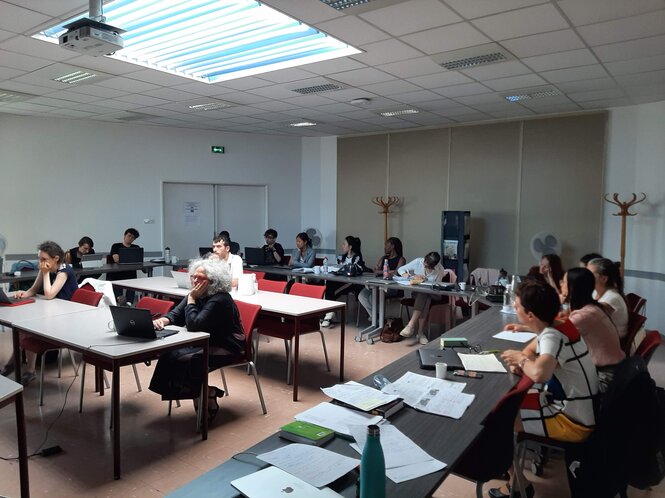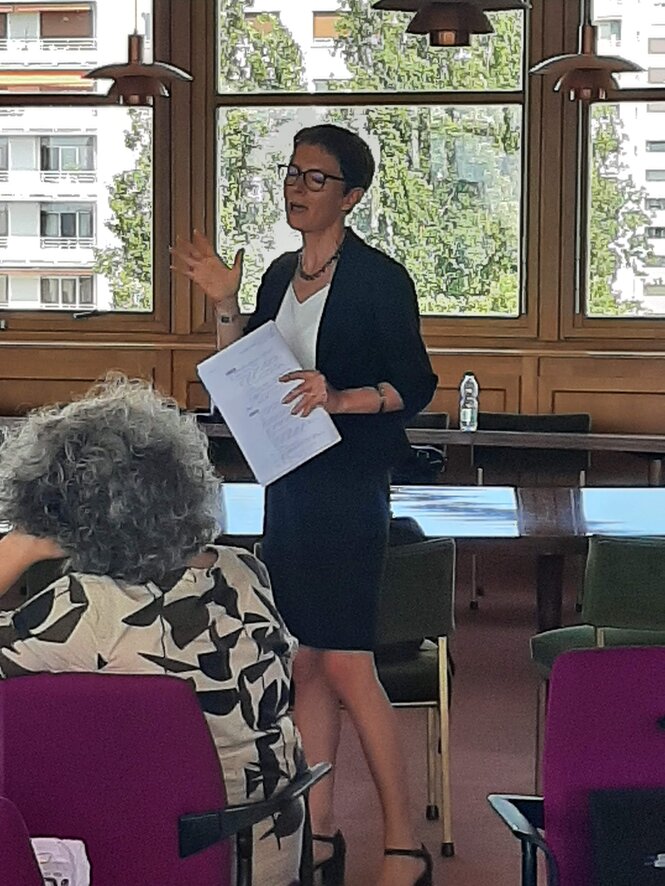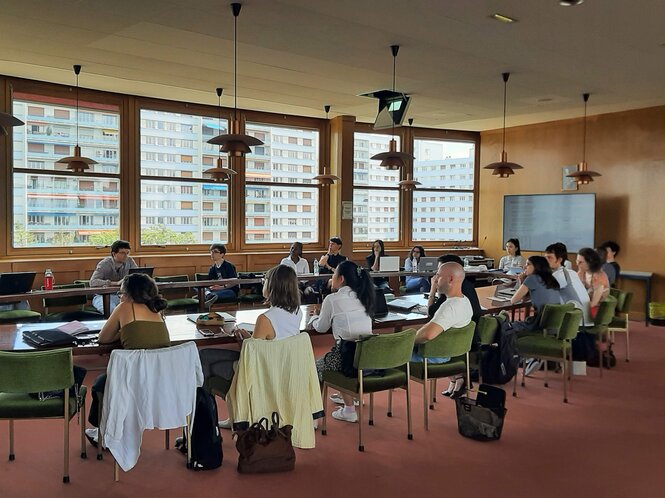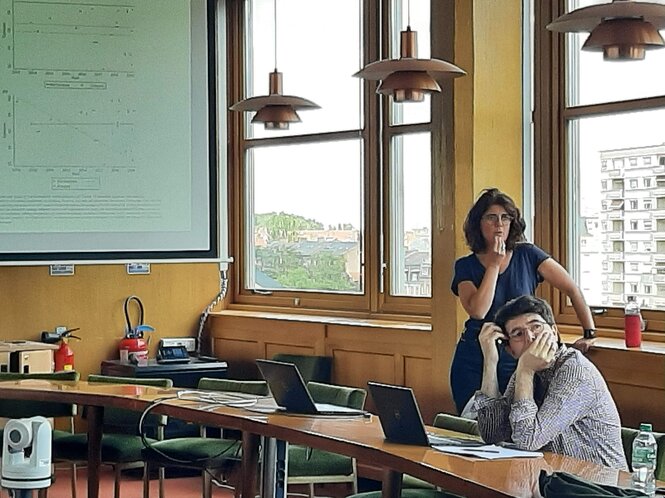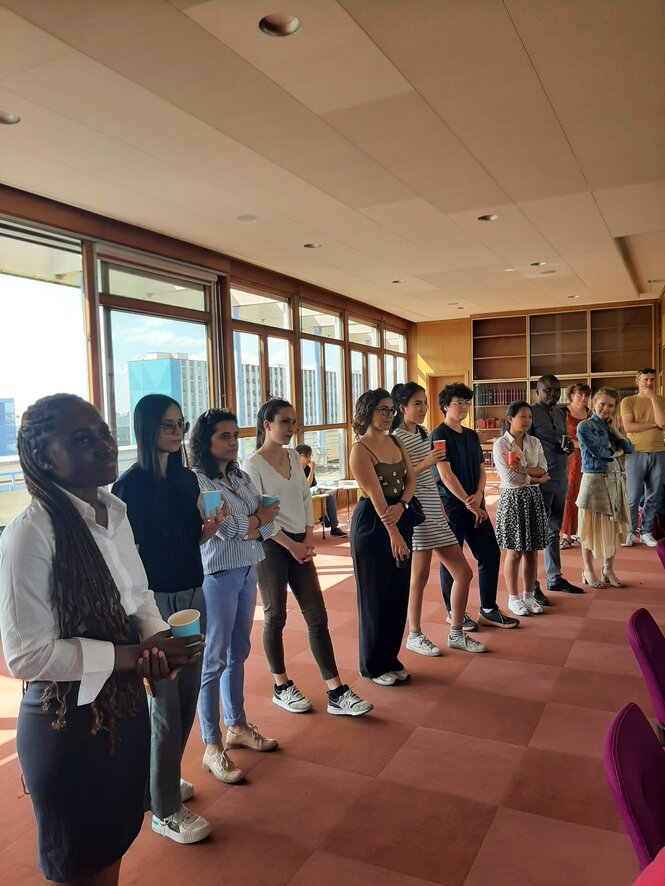- 2025-MAKErS Interdisciplinary summer school: "Data & research methods about Europe - Issues and uses"
- 2024-Summer school « Dissonant Heritage and European citizenship »
- 2023-MAKErS Interdisciplinary summer school: "Production, access and analysis of sources and data on Europe in the social sciences and humanities - Issues and uses"
Summary
2025-MAKErS Interdisciplinary summer school: "Data & research methods about Europe - Issues and uses" socio-economic statistics, legal sources, historical archives, etc...
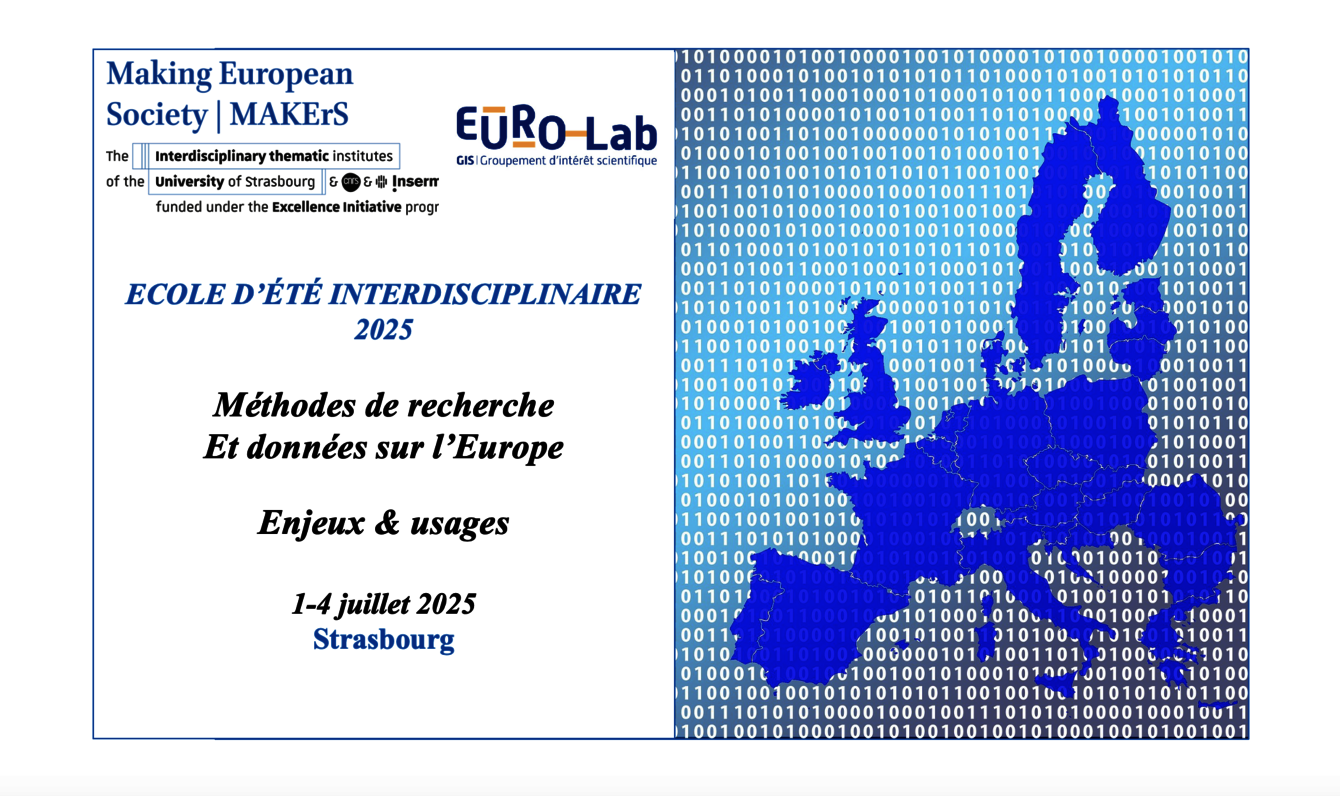
The MAKErS 2023 interdisciplinary summer school "Data & research methods about Europe - Issues and uses" will be held in Strasbourg from 1st to 4th July 2025.
The PhD students and young doctors taking part will have the opportunity to :
- discuss their doctoral research with researchers and experts and share their experiences,
- learn about different research methods,
- consider the issues involved in accessing and processing certain data (archives, legislative acts, legal databases, statistical data, institutional documents, speeches, biographies, etc.)
to improve the processing and analysis of their materials on Europe.
The call for papers is open until 16 May 2025.
Scientific Committee
- Pierre Alayrac, political science - Paris 8 University
- Amélie Barbier-Gauchard, economics - University of Strasbourg
- Ségolène Bardou des Places, law - University Paris 1
- Morgane Le Boulay, history & political science - University of Strasbourg
- Hélène Michel, political science - University of Strasbourg
- Vincent Reveillère, law - University Aix-Marseille
- Mélanie Schmitt, law - University of Strasbourg
- Antoine Vauchez, political science - University Paris 1
- Laurent Warlouzet, history - Sorbonne University
Organisée en partenariat avec le GIS EURO-Lab - réseau interdisciplinaire de recherche sur l'Union européenne - l'édition 2025 a permis de croiser les regards académiques et institutionnels grâce au soutien du Conseil de l'Europe.
Téléchargez le programme final
Visite du Palais de l'Europe
Dans ce cadre, 2 demi-journées ont été organisées avec les services du Conseil de l'Europe :
- Jeudi 3 juillet aux archives centrales du Conseil de l'Europe
- Vendredi 4 juillet : Comité Européen des Droits Sociaux (CEDS) du Conseil de l'Europe
Visite des archives centrales du Conseil de l'Europe
Lire l'article du conseil de l'Europe
Lire l'article du Magazine Savoir(s)
Lire l'article du GIS EURO-Lab
12 doctorant.e.s en droit, science politique, économie, sociologie ou encore études européennes, issu.e.s d'universités ou institut belge, français, ou allemand ont ainsi pu présenter et échanger sur leurs travaux.
Communications des participant.e.s :
- Marie ACABO, doctorante en sociologie politique à l’université de Strasbourg : « Division du travail et construction des archives du travail politique européen : quelles méthodes pour étudier les professionnel.les invisibles de l’Europe ? »
- Sarah AUCLAIR, Doctorante en droit de l’université Paris-Est Créteil :« Méthode d’analyse automatisée : étude d’un corpus jurisprudentiel multilingue de la CJUE en matière de genre »
- Marina CABADA, Doctorante en droit de la Proppriété Intellectuelle de l’université de Strasbourg : « Building the Decision Makers of the European Union Intellectual Property Office (EUIPO) »
- Audrey DEVERSON, Doctorante en droit de l’université de Strasbourg :« Défis méthodologiques d’une recherche juridique sur les travailleuses migrantes en France et en Espagne »
- Nils ENDERLIN, Doctorant MAKErS en droit social de l’université de Strasbourg : « Définir et mesurer l’effectivité du Socle européen des droits sociaux du point de vue la « socialisation » de la gouvernance économique européenne »
- Tibissaï GUEVARA-BRAUN, Docteure en science politique de l'Ecole Normale Supérieure de Lyon : « Socio-histoire des dispositifs institutionnels, réseaux et pratiques de socialisation transnationale europarlementaire en contexte de pré-adhésion à l’Union européenne »
- Edouard HARGROVE, Doctorant en science politique de l'université Paris1 Patnhéon-Sorbonne : « « LIBE is very political » : S’entretenir avec des élites politiques et leurs entourages »
- Anna HOBERG, Doctorante en histoire du droit au Max-Planck Institüt de Francfort (Allemagne) : « La formation du droit international privé de l'Union européenne : Acteurs et institutions »
- Tom LOGEL, Doctorant MAKErS en science politique de l'Université de Strasbourg : « De l’utilisation d’archives dans une thèse en science politique de l’UE »
- Catharina LOPES-SCODRO, Doctorante en droit du travail de l'Université de Strasbourg : « Travailleuses invisibles ? Les défis d’une enquête sociojuridique comparée sur les jeunes au pair »
- Adalgisa MARTINELLI, Doctorante en science politique de l'Université Libre de Bruxelles (Belgique) : « Le récit de la souveraineté alimentaire européenne : un instrument de légitimation pour l’Union Européenne »
- Daria PETLIAEVA, Doctorante en science politique de l'Université Jean Monnet de Saint-Etienne : « Étudier l’action extérieure de l’UE à l’égard de la société civile russe après le 24 février 2022 »
La cérémonie de remise des certificats aux participant.e.s a été présidée par Madame Anaïs HAMELIN, Vice-présidente Recherche déléguée aux SHS de l'Université de Strasbourg
Comité scientifique
- Pierre Alayrac, science politique - Université Paris 8
- Amélie Barbier-Gauchard, économie - Université de Strasbourg
- Ségolène Bardou des Places, droit - Université Paris 1
- Morgane Le Boulay, histoire et science politique - Université de Strasbourg
- Hélène Michel, science politique - Université de Strasbourg
- Vincent Réveillère, droit - Université d'Aix-Marseille
- Mélanie Schmitt, droit - Université de Strasbourg
- Antoine Vauchez, science politique - Université Paris 1
- Laurent Warlouzet, histoire - Sorbonne Université
2024-Summer school « Dissonant Heritage and European citizenship » Master Erasmus mundus “Euroculture”

Dates : 1 to 7 july 2024
Europe's cultural heritage is a jigsaw puzzle whose pieces form part of the same picture, without overlapping. In the past, conflicting or controversial perspectives on different historical memories and experiences have clashed and continue to do so today. These controversial legacies are often particularly difficult to convey to a wide audience and can lead to exclusion. Nevertheless, if they are transmitted with discernment, they can contribute to a process of distancing, in which an awareness of the European evening is shaped by a dialogue between different positions. The notion of ‘Dissonant heritage’ is part of this process of negotiating a multiple identity.
Organised at the Manufacture des Tabacs in Strasbourg by Professor Alexandre Kostka, head of the Euroculture master's programme, and Julia Meyer, the summer school brought together around 130 students and teachers from the twelve universities ((Strasbourg, Groningen, Bilbao, Göttingen, Uppsala, Olomouc, Krakow, Udine, Pune, Osaka, Canada, UNAM)) participating in the network, as well as numerous specialists in the field.
The full programme can be found here
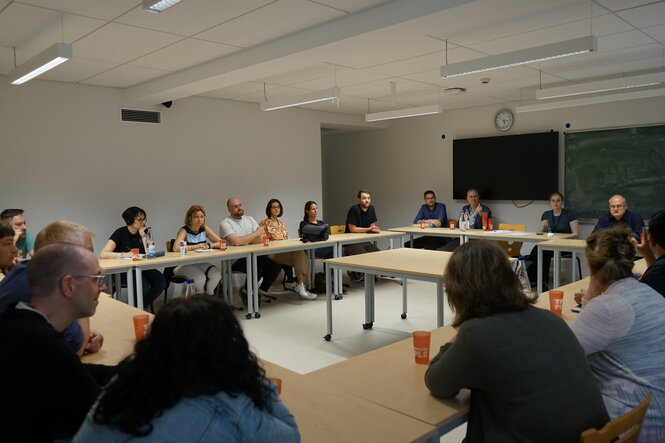
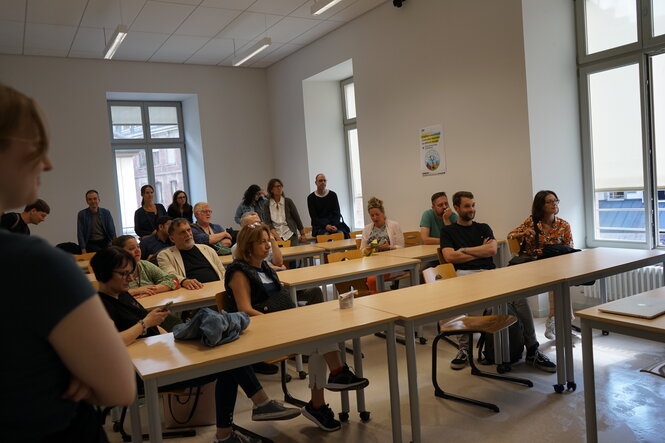
2023-MAKErS Interdisciplinary summer school: "Production, access and analysis of sources and data on Europe in the social sciences and humanities - Issues and uses" socio-economic statistics, legal sources, historical archives, etc...
Dates : 3 to 6 july 2023
The MAKErS 2023 interdisciplinary summer school was held in Strasbourg from from 3 to 6 july 2023.
Organised by the MAKErS ITI in association with the GIS Euro-Lab, it provided an opportunity for doctoral students and young PhDs to discuss the production, access and analysis of data on Europe and European societies. Aimed primarily at specialists on Europe, it was also open to anyone whose work may involve European data policies and/or data on Europe or European countries.
Participation
Around fifteen doctoral students and young doctors from various disciplines (economics, sociology, political science, history, social law, EU international law). Coming from different countries and sometimes different continents, they presented their work and exchanged views with researchers and experts on the difficulties and challenges of working with data. By sharing their respective experiences, they were able to acquire methods, discover ways of accessing and improving the processing and analysis of their data.
Practical organisation
The summer school alternated between group work based on participants' papers and workshops on collecting and processing European data.
The programme is available here
Communications from participants:
- Mathilde BILLON-GRAND, doctoral student in political science of Paris 1 Panthéon-Sorbonne university: « L’espace européen des données de la santé »
- Léo CORBEL, Doctoral student in political science of Strasbourg university:« Étudier l’intégration européenne par les cartes de l’Europe. Étude de cas, enjeux pratiques et épistémologiques »
- Inoussa DIANDA, Doctoral student in contempory history of Joseph Ki-Zerbo University (Burkina Faso): « Faire une thèse de doctorat sur l’Union Européenne au Burkina Faso : la problématique des sources et des données »
- Anton EICHBERGER, Doctoral student at Sciences Po Grenoble:« L'explication de la stabilité des états de facto : des problèmes partiels d'accès à des données quantitatives spécifiques »
- Pénélope HARDY, Doctoral student in social law of Strasbourg university: « L’utilisation des données européennes pour le droit à la sécurité sociale : état des lieux des données mobilisables et des méthodes »
- Maeva LE ROY, PhD in political science of European University Institute - Florence (Italiy): « Production de données et construction des États européens : enregistrer les opinions politiques dans les États du Nord-Ouest de la péninsule italienne (années 1790 – années 1810) »
- Margaux LUCAS, MAKErS Doctoral student in political science of Strasbourg university: « Une statistique égalitaire sensible, de sa production pour l’Union à son analyse par le chercheur »
- Allegra MAMFOUANA, PhD in law sciences of Toulon l’university:« L’utilisation par l’Union du multilinguisme pour la garantie de l’accès aux données européennes »
- Elodie MIGLIORE, Doctoral student at CEIPI - Strasbourg University: « L’accès aux données obstrué par les droits de la propriété intellectuelle : entraves et solutions »
- Adeline MORAIS-AFONSO, Doctoral student in History - Sorbonne University « L’histoire de l’intégration européenne : l’enjeu des langues et de la traduction dans le traitement des sources historiques »
- Nathalia SARMIENTO, Doctoral student in international law of Strasbourg university: « L’étendue de la transparence sur l’utilisation du budget européen destiné à l’assistance humanitaire et militaire en Ukraine »
- Shiming SHEN, Doctoral stuent in Information & CommunicationSciences of Côte d’Azur University: « Comment traiter les artefacts audiovisuels ?Une étude de cas sur l'Union européenne »
- Marion TOSOLINI, student in Master 2 economics of ENS Paris-Saclay: "L'utilisation des archives dans une perspective d'économie institutionnaliste : l'exemple des emprunts de la CECA"
- Elise WOLFERMANN, MAKErS Doctoral student in sociology & political science of Strasbourg University: "Archiver les mouvements sociaux par le bas. Exploitation des « Archive von unten » en Allemagne et perspectives de comparaison avec les archives militantes françaises"
- Jing-Syuan WONG, Marie Sklodowska-Curie Doctoral stuent in political & social sciences of Bruxelles university (Belgium): " Faire des recherches de terrain dans des contextes autoritaires et politiquement sensibles : comment négocier l'accès aux sources"
Report from the BNU in Strasbourg on the session "The web as a source for research" at the summer school. Read the article published in Hypothèses here
Scientific Committee:
- Amélie Barbier-Gauchard (economics - University of Strasbourg)
- Ségolène Bardou des Places (law - University Paris 1)
- Marine de Lassalle (sociology - University of Strasbourg)
- Anne-Laure Delatte (economics - University Paris Dauphine)
- Morgane Le Boulay (history & political science - University of Strasbourg)
- Hélène Michel (political science - University of Strasbourg)
- Vincent Reveillère (law - University Aix-Marseille)
- Mélanie Schmitt (law - University of Strasbourg)
- Antoine Vauchez (political science - University Paris 1)
- Laurent Warlouzet (history - Sorbonne University)



